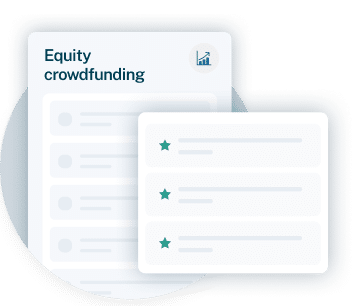Take the pain out of finding investors for your business
Swoop uses smart matching to match your business to the most suitable investors from its huge network of over 200 venture capital funds, angel networks, family offices and angel investors.

Swoop uses smart matching to match your business to the most suitable investors from its huge network of over 200 venture capital funds, angel networks, family offices and angel investors.

If your business needs money to grow, you’ve the option of selling a stake in exchange for investment. Equity finance investors will have a claim on your future earnings but, in contrast to a loan, you don’t pay any interest – nor do you have to repay capital.
Equity finance could suit your business if you have an expansion plan or project that lenders such as banks aren’t willing to support, or if you want to avoid loan payments.
Your journey from startup to successful business could involve multiple rounds of equity financing from different types of investors, e.g. business angels, venture capitalists and private equity funds. Equity finance has two obvious advantages for businesses:
Read about some popular types of equity finance below, but it’s best to register now for full access to all the options available to you.

Equity crowdfunding is a type of equity financing whereby people (‘the crowd’) invest in an early-stage unlisted company, in exchange for shares (equity) in that company. Ready to take on crowdfunding investors?
Equity finance is the method of raising fresh capital by selling shares of your company in return for a share in the ownership (equity) of the business and will share in the profits. The people who buy the shares then become your shareholders.
Equity financing can be a good option for new or small businesses that are finding it difficult to get a loan.
Equity financing works by selling a company’s stock in exchange for cash. The proportion of your company that is sold will depend on how much has been invested in the company and what the business is worth at the time of financing. As your business grows, so will the value of the investor’s stake in your company.
Businesses can choose multiple rounds of equity financing from different types of investors, such as business angels, crowdfunding, or venture capitalists (VCs).
Equity crowdfunding is a type of equity financing whereby people (‘the crowd’) invest in an early-stage unlisted company, in exchange for shares (equity) in that company. Individual investors thus become shareholders and stand to profit if the business does well – they might also lose some or all of their investment. Equity crowdfunding usually takes place over an online platform.
While equity financing requires you to sell a stake in your business in return for funds, debt financing involves borrowing money and repaying it with interest added, with the most common form being a loan.
Unlike equity, debt does not involve relinquishing any share in ownership or control of your business. However, equity financing is generally viewed as the less risky of the two as there is no obligation to pay back the money injected into your business, so there are no monthly repayments and the money invested can be put towards helping the business grow.
Businesses can benefit from both debt financing and equity financing, but businesses that require a large amount of money to grow and scale quickly will usually find equity financing more suitable, while those that need funds quickly to finance everyday expenses and operations may prefer debt financing.
Debt financing is usually (though not always) cheaper than equity financing because equity investors take on more risk and therefore demand higher returns. The interest you pay on debt financing is also tax deductible, whereas dividends paid to shareholders are not.
In addition, once the loan is fully repaid, your company will have no further obligation to the lender, making it a cheaper option than equity financing for profitable companies.
Convertible debt is where money is invested in a company in exchange for shares to be issued at a later date – often when the company has raised finance from other investors. In return for investing early, convertible equity investors are given a discount on the price of the shares issued to other investors.
Before deciding whether equity finance is right for your business, it’s worth asking yourself the following questions:
If you’re happy to give up a share of your company in return for investment in your business and you would benefit from expert knowledge and experience, equity finance could be right for you.
If you’ve decided equity finance would suit your business, register with Swoop to speak abut how we can assist in match you with the most relevant equity finance for your business; our team are more than happy to offer you some free advice on your options.
Join the 95,000+ businesses just like yours getting the Swoop newsletter.
Free. No spam. Opt out whenever you like.
Kingfisher Way, Silverlink Business Park, Newcastle upon Tyne, NE28 9NX, UK
View in Google Maps35 Bull Street, Lewis Building, Birmingham B4 6AF, UK
View in Google MapsAberystwyth Innovation and Enterprise Campus
Gogerddan Campus
Aberystwyth University
Ceredigion
SY23 3EE
Dogpatch Labs, The CHQ Building, Custom House Quay, Dublin, Ireland
View in Google MapsSuite 801, Level 8, 84 Pitt Street, Sydney, NSW 2000, Australia
View in Google Maps43 W 23rd St, New York, NY 10010, United States
View in Google Maps21 Dreyer Street, Cape Town, South Africa, 7708
View in Google MapsClever finance tips and the latest news
Delivered to your inbox monthly
Join the 95,000+ businesses just like yours getting the Swoop newsletter. Free. No spam. Opt out whenever you like.




